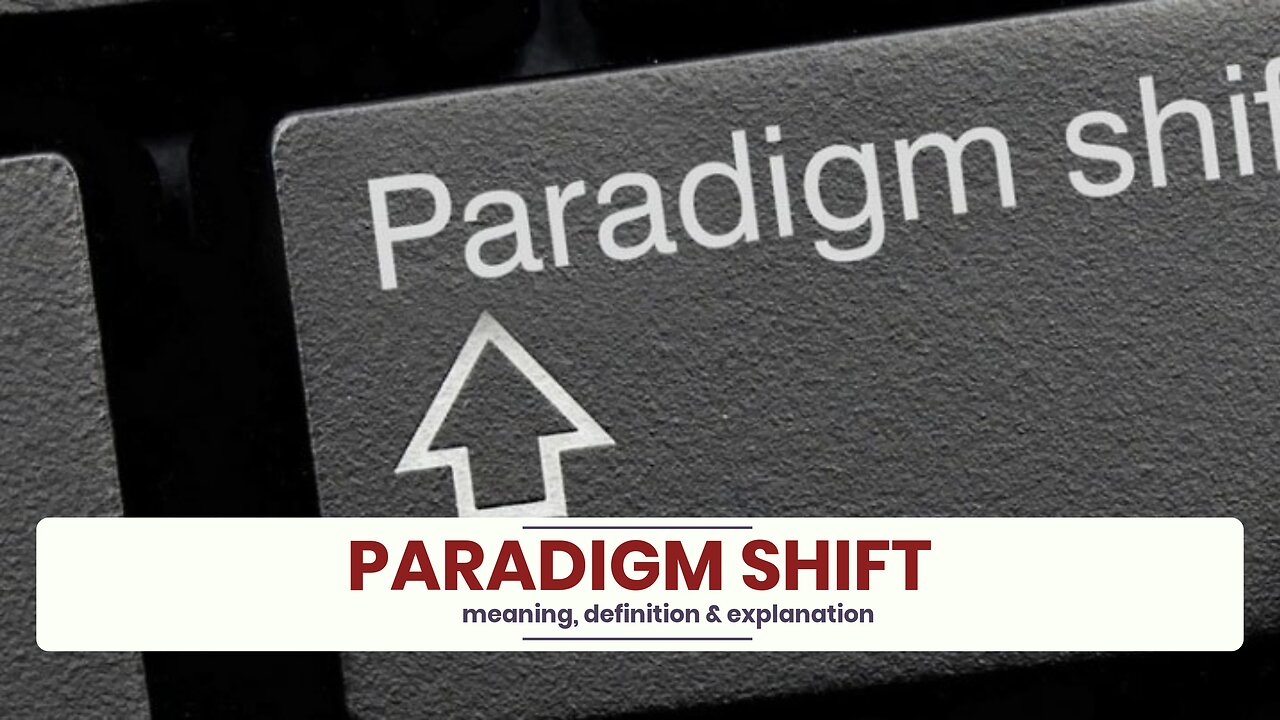Premium Only Content

What is PARADIGM SHIFT?
✪✪✪✪✪
http://www.theaudiopedia.com
✪✪✪✪✪
What is PARADIGM SHIFT? What does PARADIGM SHIFT mean? PARADIGM SHIFT meaning - PARADIGM SHIFT definition - PARADIGM SHIFT explanation.
Source: Wikipedia.org article, adapted under
https://creativecommons.org/licenses/by-sa/3.0/
license.
A paradigm shift, as identified by American physicist and philosopher Thomas Kuhn, is a fundamental change in the basic concepts and experimental practices of a scientific discipline. Kuhn contrasted these shifts, which characterize a scientific revolution, to the activity of normal science, which he described as scientific work done within a prevailing framework (or paradigm). In this context, the word "paradigm" is used in its original meaning, as "example" (Greek: ????????µ?).
The nature of scientific revolutions has been a question posed by modern philosophy since Immanuel Kant used the phrase in the preface to his Critique of Pure Reason (1781), referring to Greek mathematics and Newtonian physics. In the 20th century, new crises in the basic concepts of mathematics, physics, and biology revitalized interest in the question among scholars. It was against this active background that Kuhn published his work.
Kuhn presented his notion of a paradigm shift in his influential book The Structure of Scientific Revolutions (1962). As one commentator summarizes:
Kuhn acknowledges having used the term "paradigm" in two different meanings. In the first one, "paradigm" designates what the members of a certain scientific community have in common, that is to say, the whole of techniques, patents and values shared by the members of the community. In the second sense, the paradigm is a single element of a whole, say for instance Newton’s Principia, which, acting as a common model or an example... stands for the explicit rules and thus defines a coherent tradition of investigation. Thus the question is for Kuhn to investigate by means of the paradigm what makes possible the constitution of what he calls "normal science". That is to say, the science which can decide if a certain problem will be considered scientific or not. Normal science does not mean at all a science guided by a coherent system of rules, on the contrary, the rules can be derived from the paradigms, but the paradigms can guide the investigation also in the absence of rules. This is precisely the second meaning of the term "paradigm", which Kuhn considered the most new and profound, though it is in truth the oldest.
Since the 1960s, the concept of a paradigm shift has also been used in numerous non-scientific contexts to describe a profound change in a fundamental model or perception of events, even though Kuhn himself restricted the use of the term to the hard sciences.
In a 2015 retrospective on Kuhn, the philosopher Martin Cohen describes the notion of the ‘Paradigm Shift’ as a kind of intellectual virus – spreading from hard science to social science and on to the arts and even everyday political rhetoric today. Cohen claims that Thomas Kuhn himself had only a very hazy idea of what it might mean and, in line with the American philosopher of science, Paul Feyerabend, accuses Kuhn of retreating from the more radical implications of his theory, which are that scientific facts are never really more than opinions, whose popularity is transitory and far from conclusive.
-
 1:52
1:52
The Audiopedia
9 months agoWhat is EXECUTIVE DIRECTOR?
531 -
 53:12
53:12
Adam Carolla
7 hours ago $7.98 earnedHealth Insurance Executive sues John Oliver for destroyed reputation + Remembering Val Kilmer #news
49.4K3 -
 3:08:35
3:08:35
TimcastIRL
7 hours agoTrump Signs GLOBAL Tariffs, Trade War Goes NUCLEAR As Market TANKS w/Mark Mitchell | Timcast IRL
223K91 -
 LIVE
LIVE
Akademiks
5 hours agoDay 1/30 Kanye West Interview Part 2 OTW. Young Thug Probation REVOKED? Lil Baby Putting Hits on Ppl
3,004 watching -
 1:10:48
1:10:48
Man in America
12 hours agoPam Bondi Wants the DEATH PENALTY—But Was Mangione FRAMED? The Evidence Will SHOCK You
54.9K27 -
 1:30:51
1:30:51
Glenn Greenwald
10 hours agoSubstack CEO on Protecting Writers from Speech Crackdowns; Week in Review: Matt Taibbi's Censorship Hearing Testimony, Fascism Expert Flees the U.S., and More | SYSTEM UPDATE SHOW #433
162K88 -
 10:57:58
10:57:58
Dr Disrespect
16 hours ago🔴LIVE - DR DISRESPECT - PGA TOUR 2K25 - ONLINE RANKED UNDEFEATED
174K25 -
 1:59:49
1:59:49
2 MIKES LIVE
11 hours ago2 MIKES LIVE #200 It's our 200th Show with guests Paul Kanitra and Dan Nunn!
65.8K8 -
 21:41
21:41
JasminLaine
8 hours agoCarney HUMILIATED—Danielle Smith DESTROYS 'Garbage Polls' & Trump RUINS His Plan
65.5K24 -
 1:04:02
1:04:02
Film Threat
10 hours agoSUPERMAN! DISNEY! DRAGONS! LIVE FROM CINEMACON! | Film Threat After Dark
24.4K1